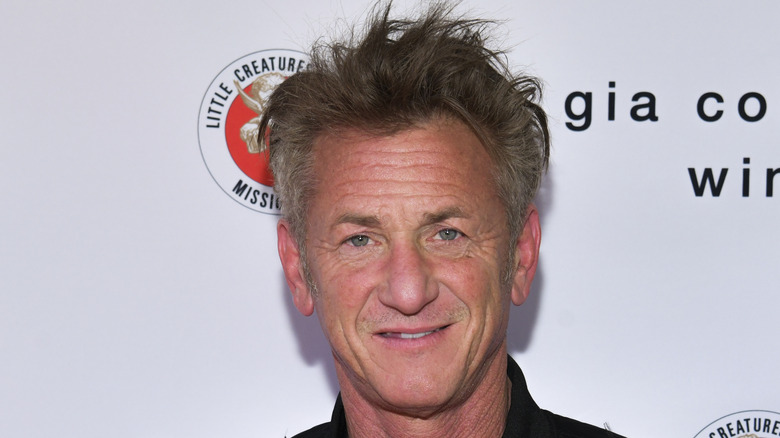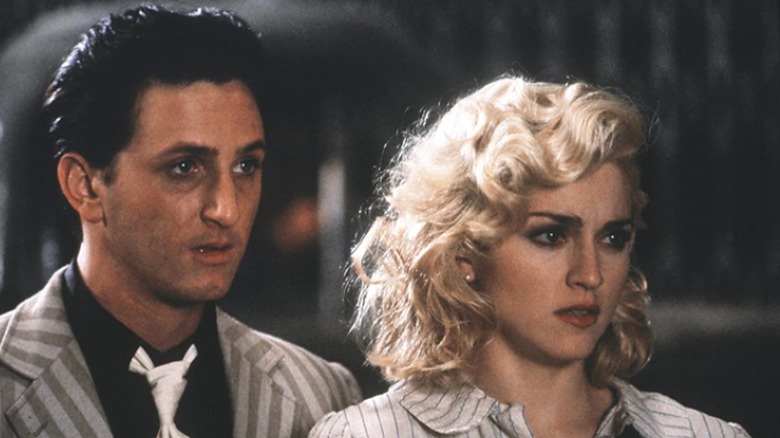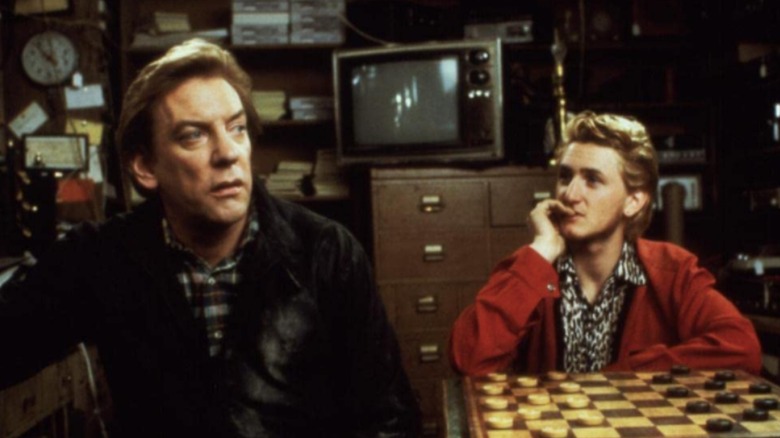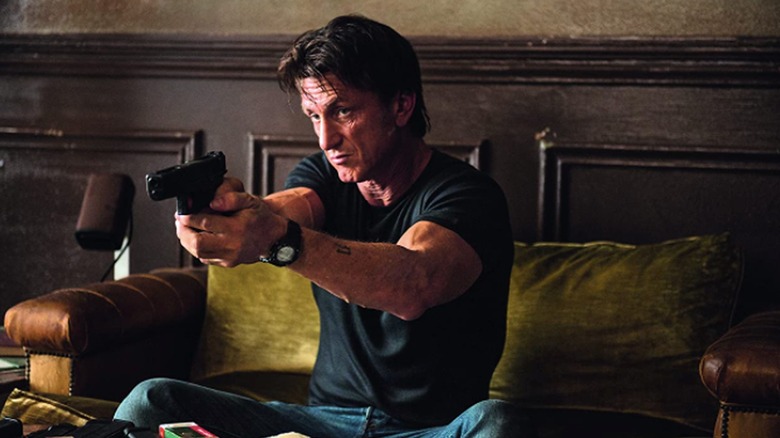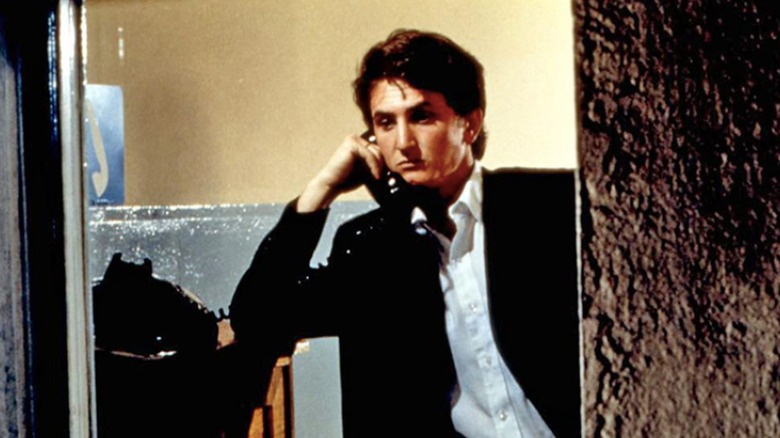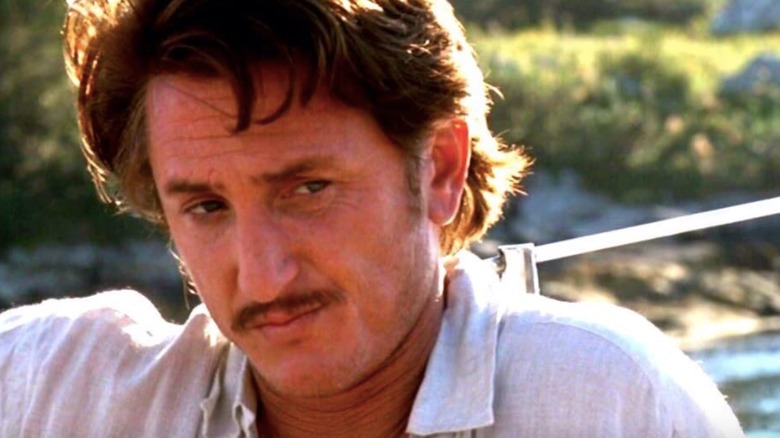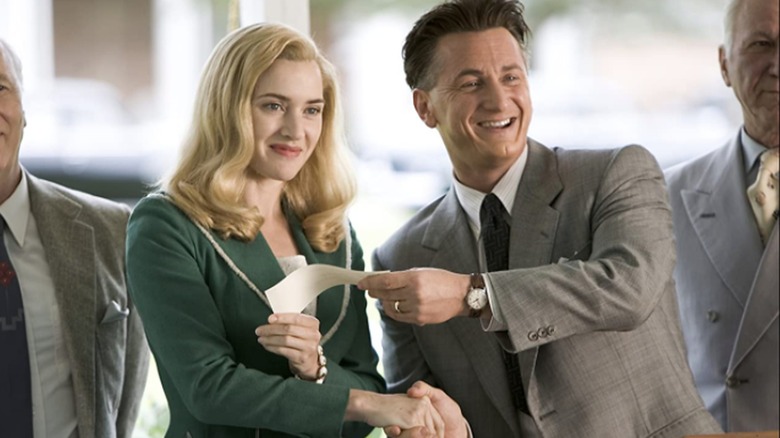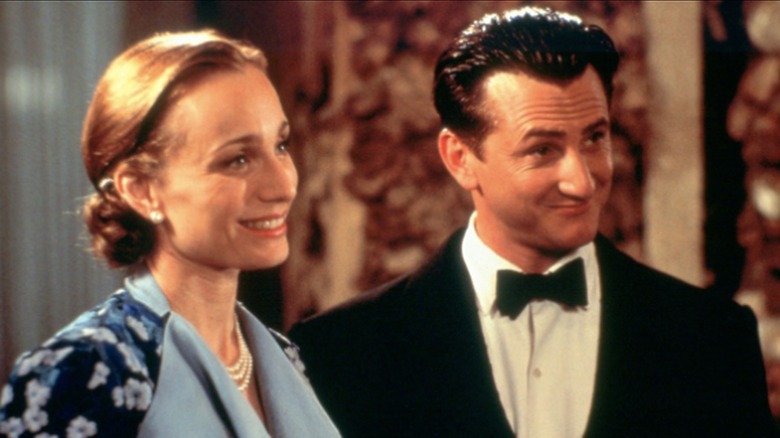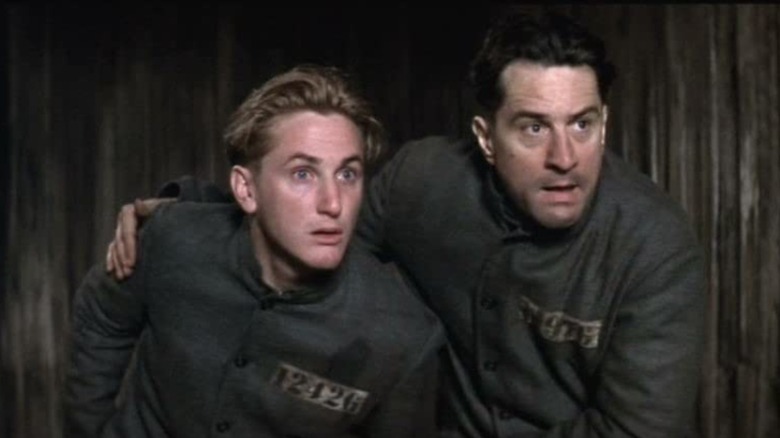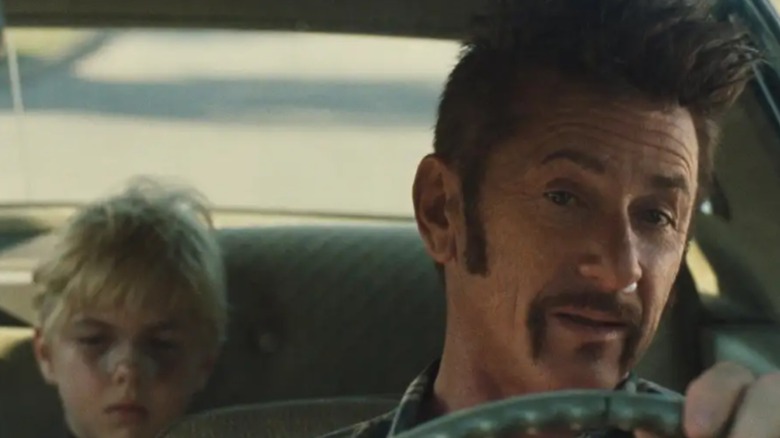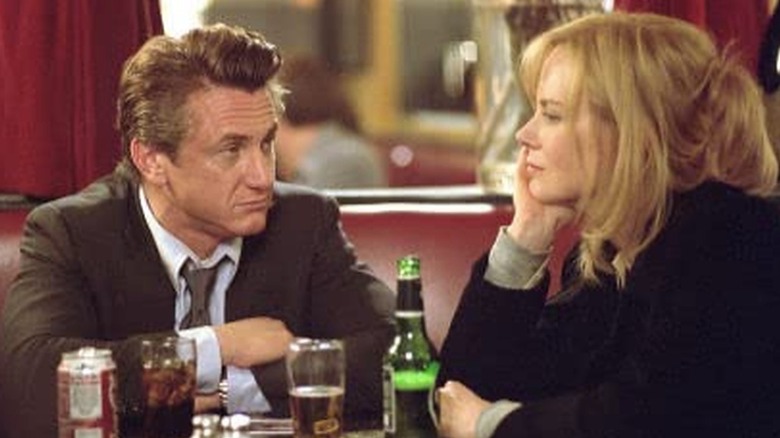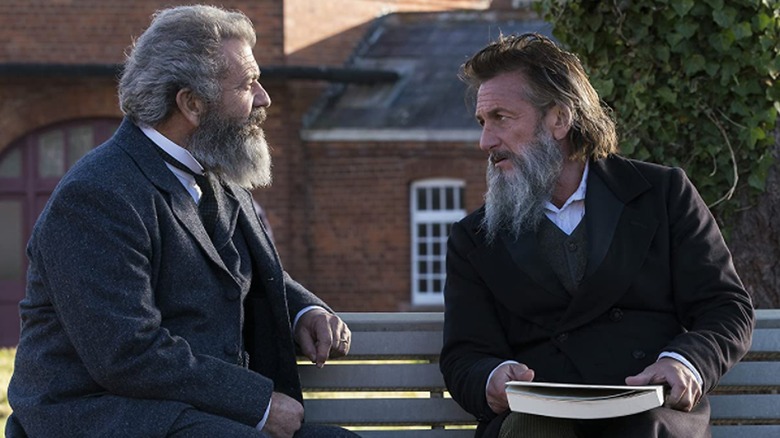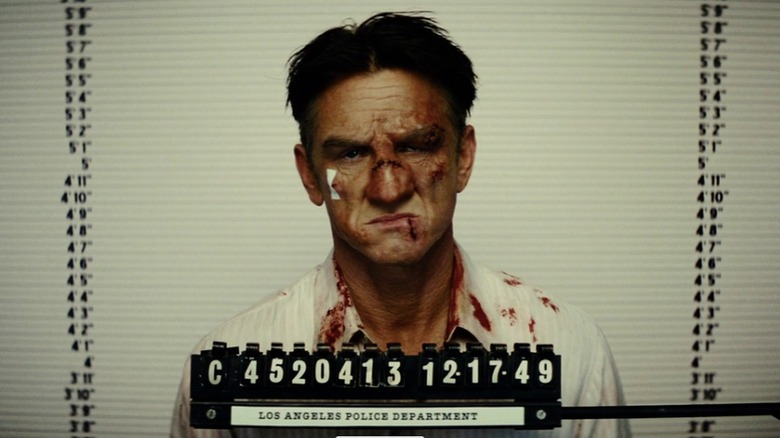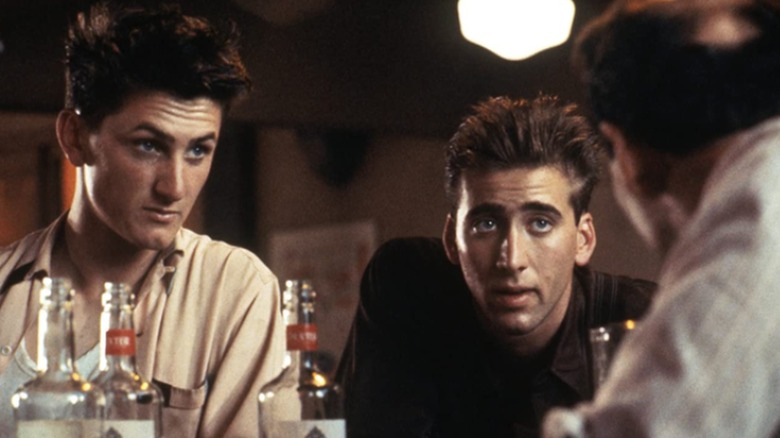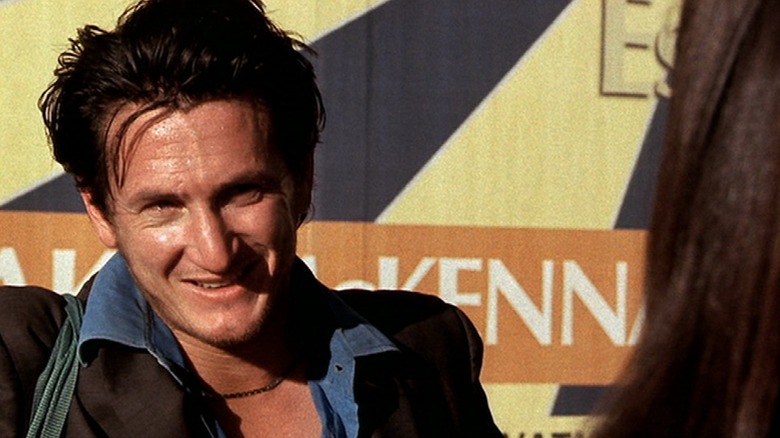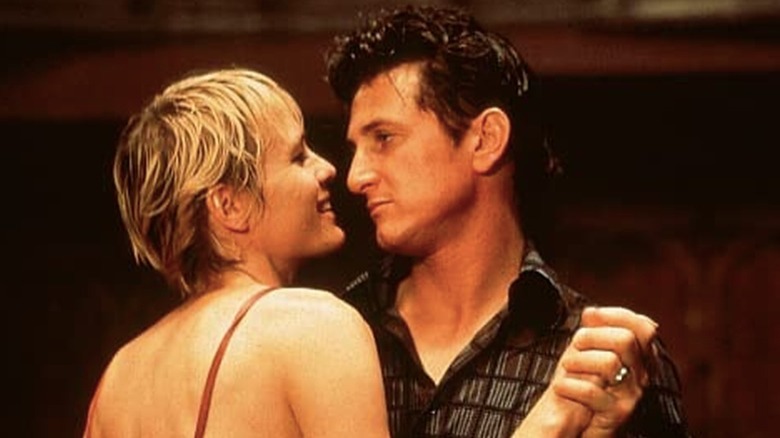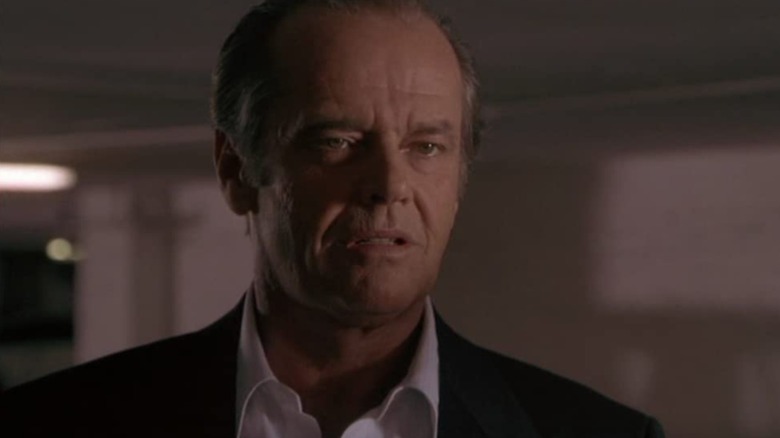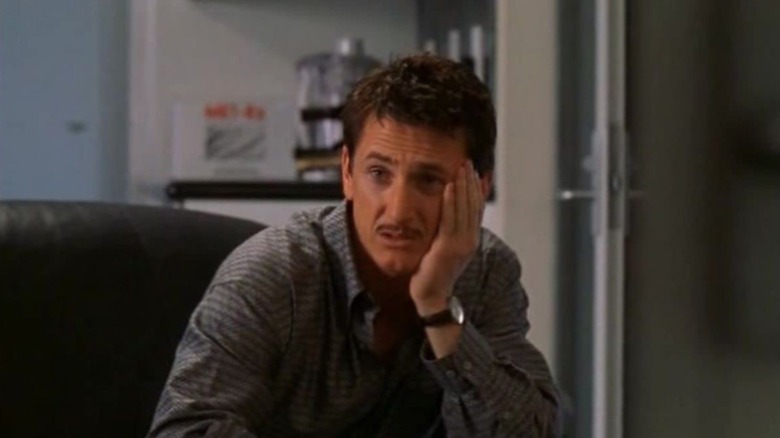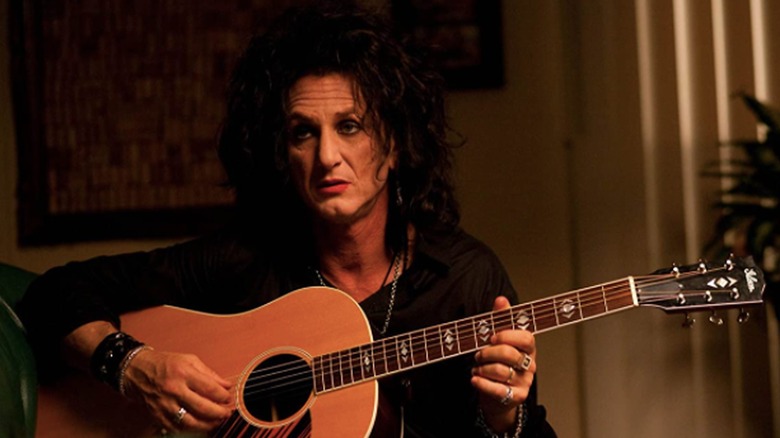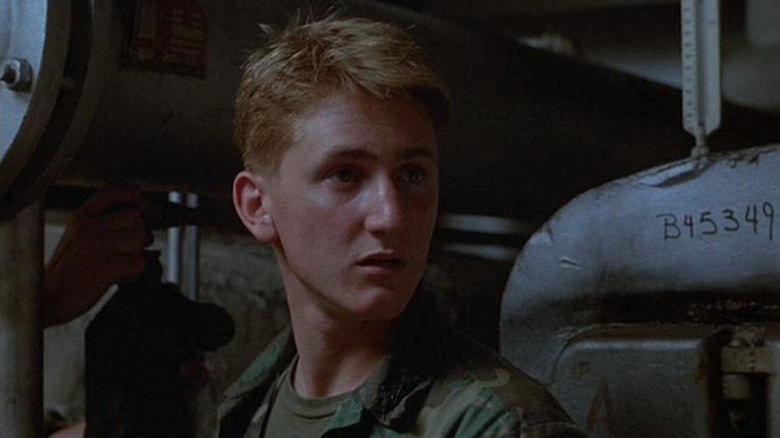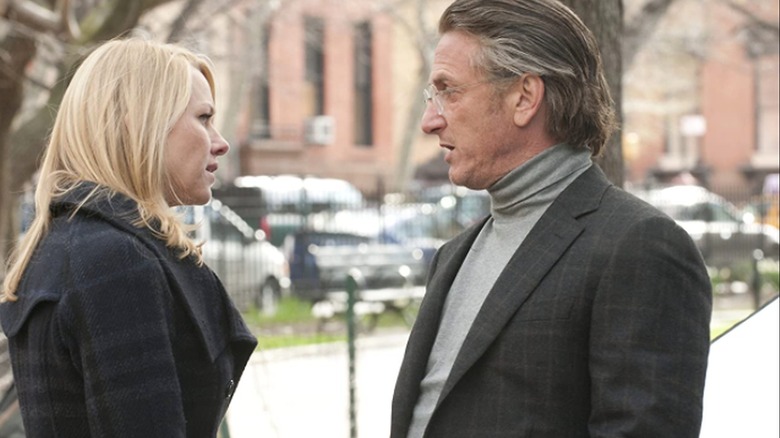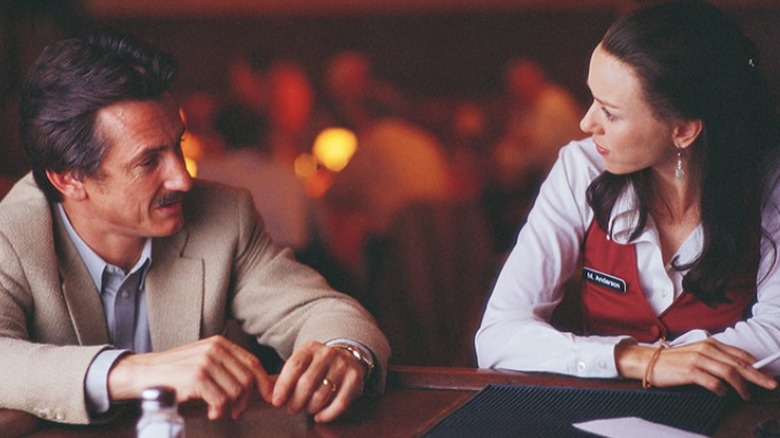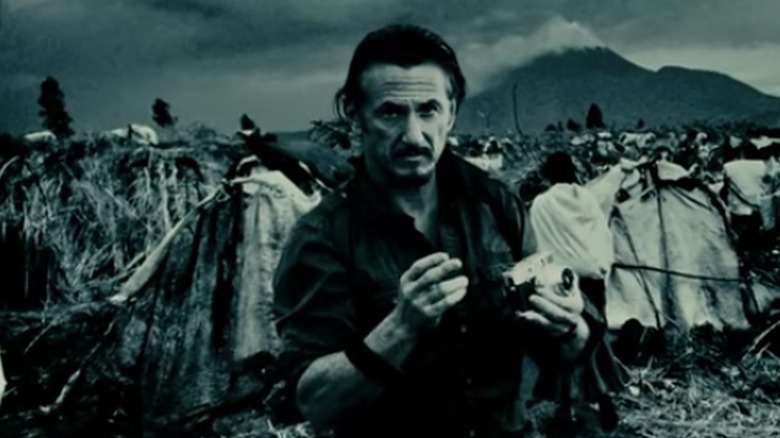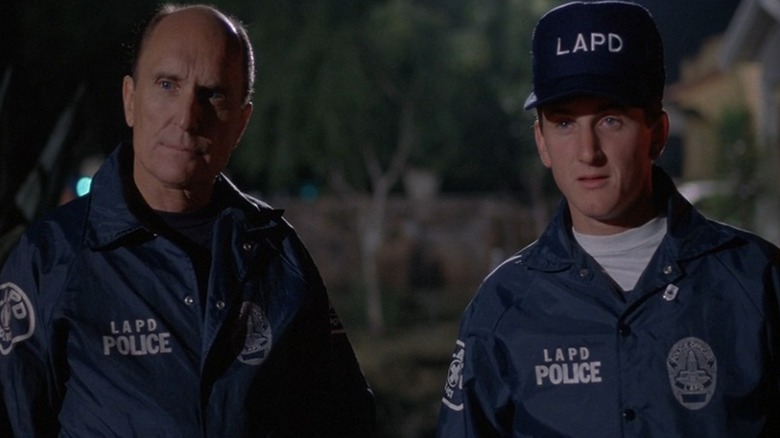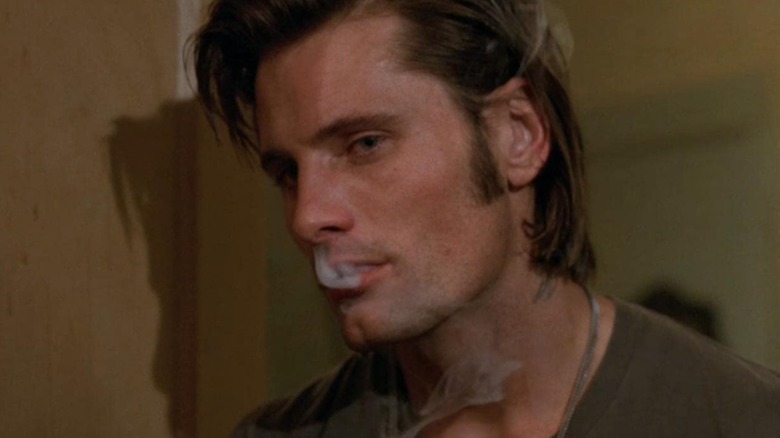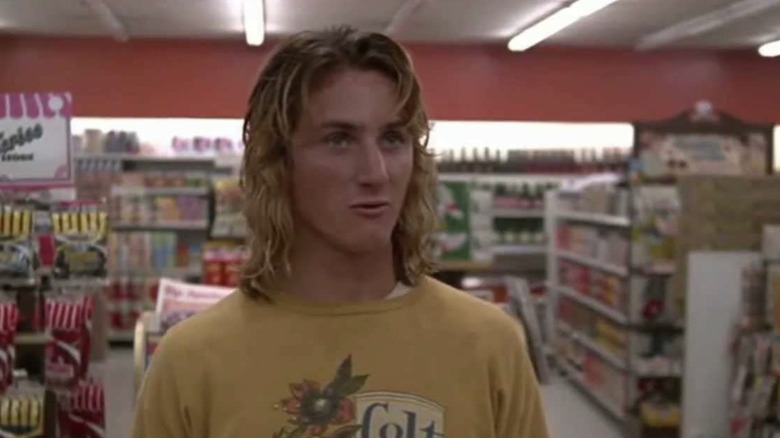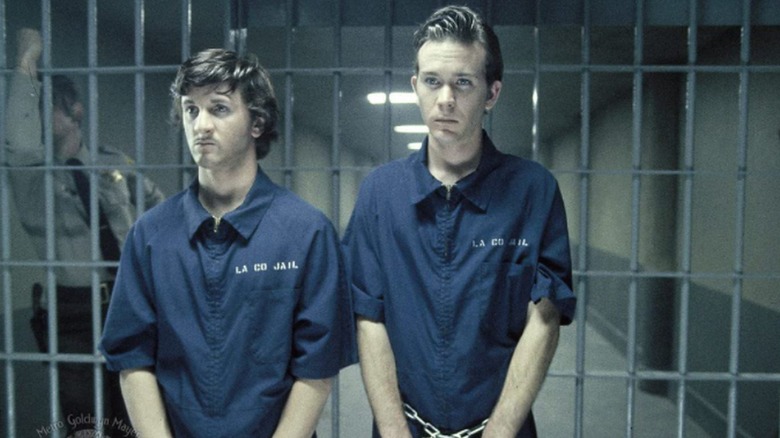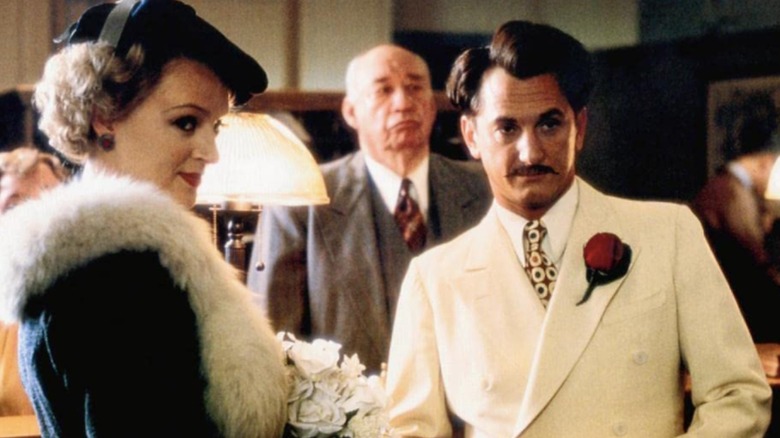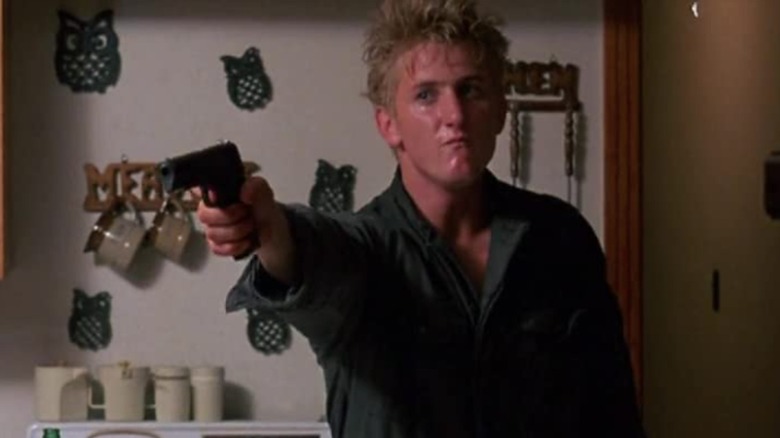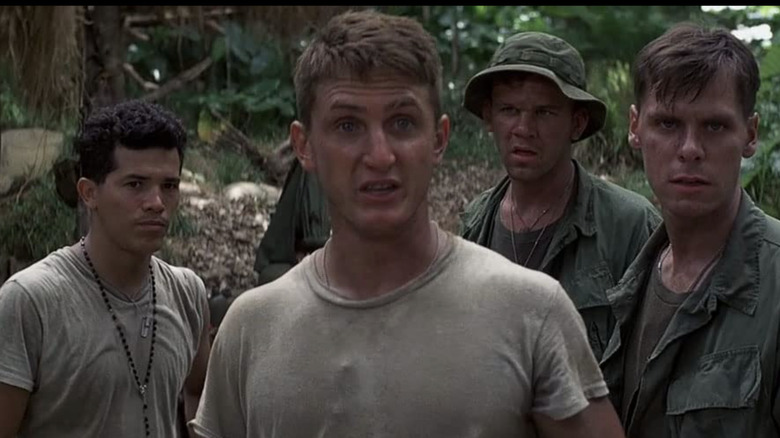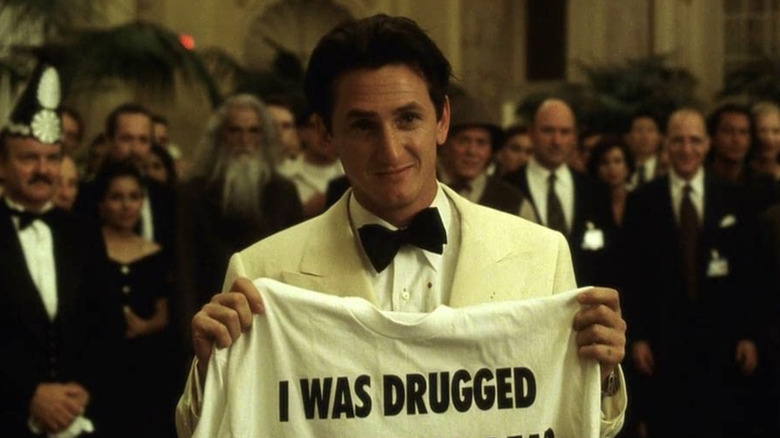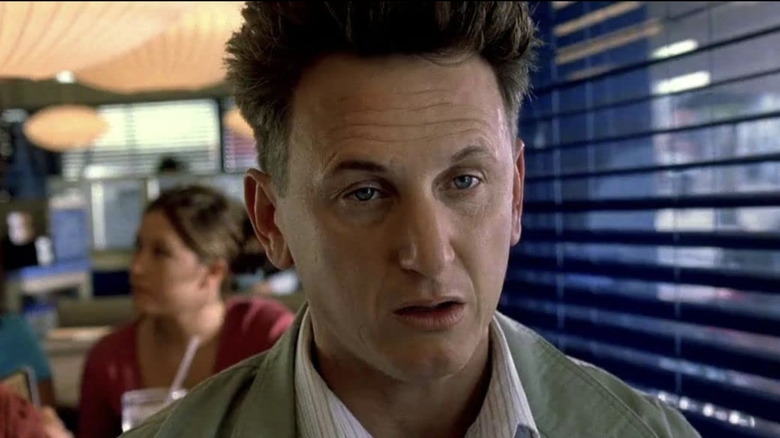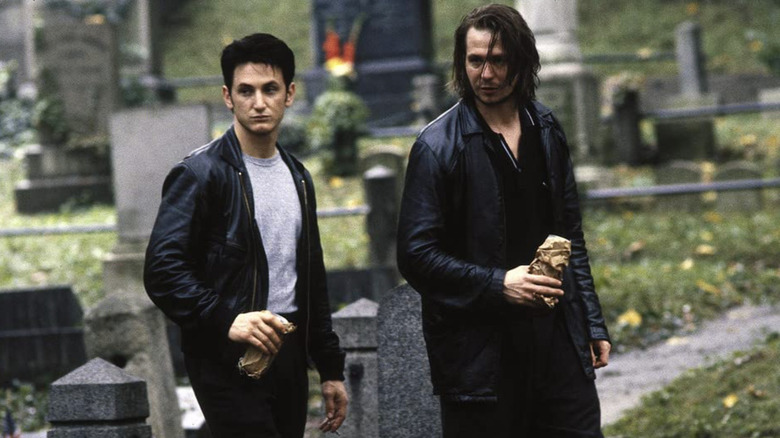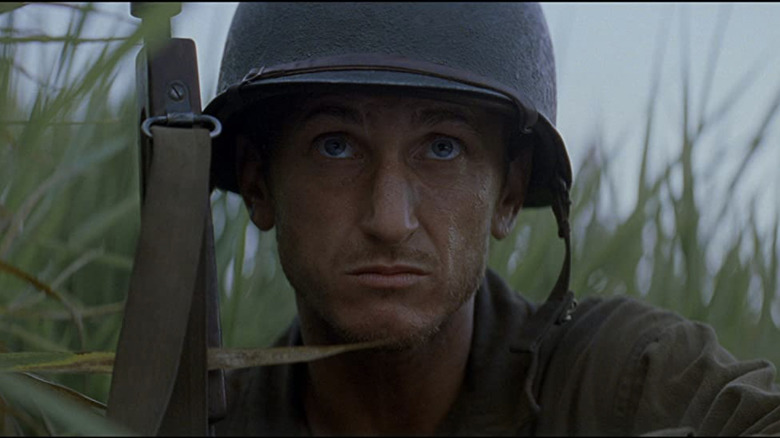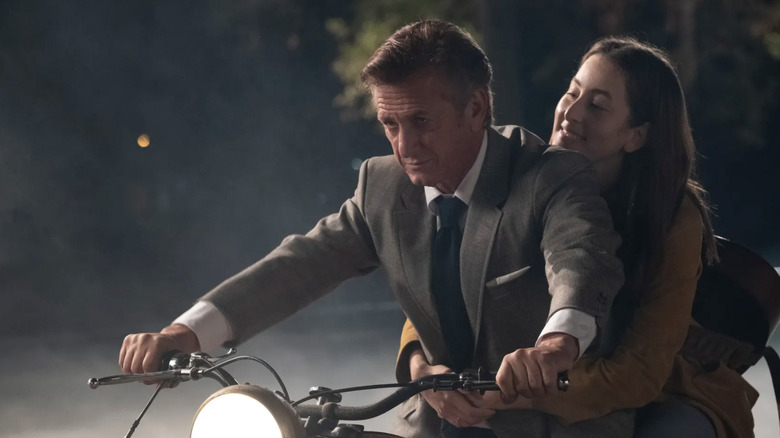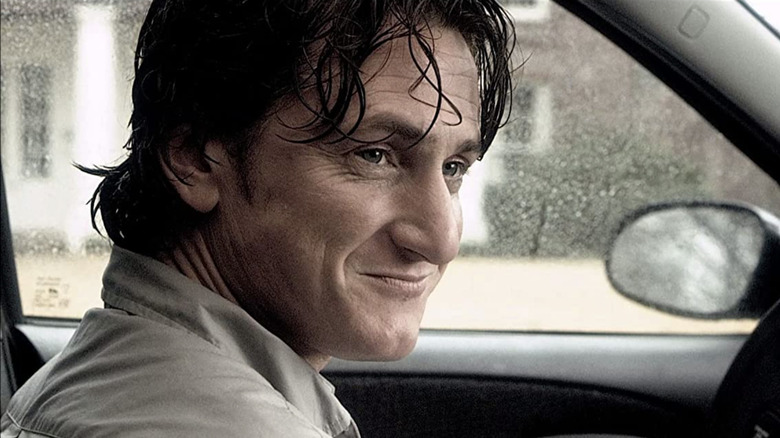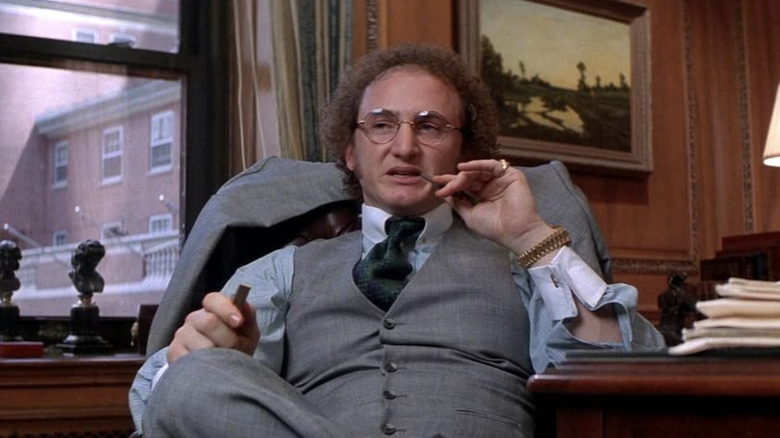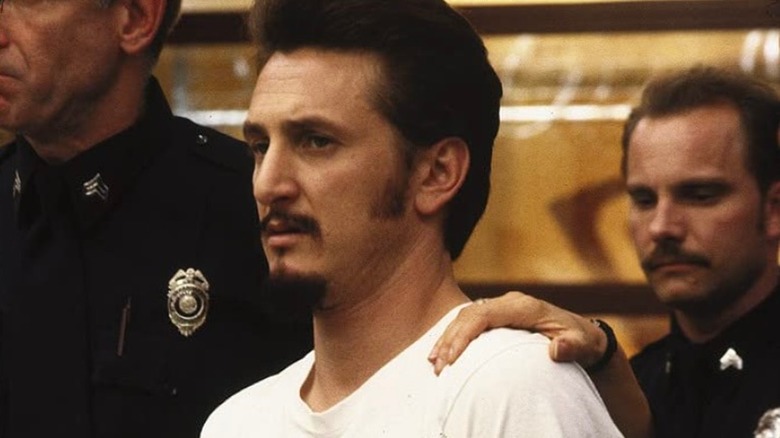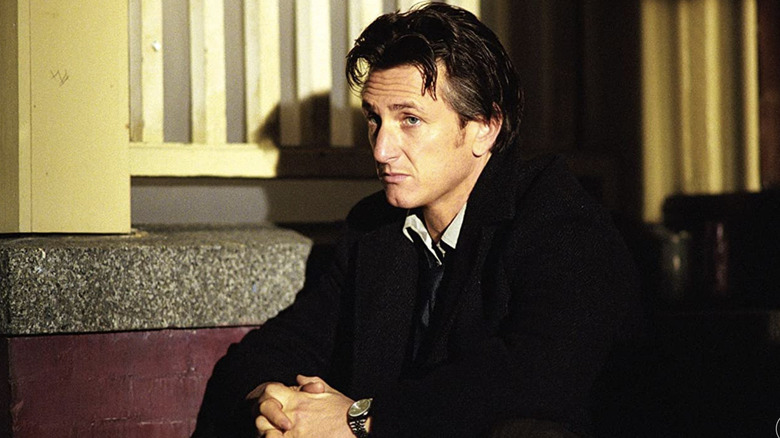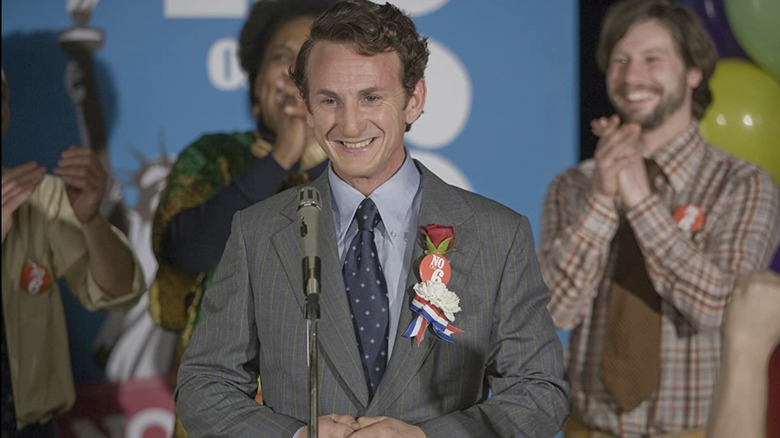Every Sean Penn Movie Ranked Worst To Best
Sean Justin Penn was born in Santa Monica, California on August 17, 1960, to Leo Penn, who worked in the entertainment industry, writing, acting and directing. This inspired young Sean to skip college, beginning his acting career in theater, in Los Angeles and then in New York, before landing television work in the '70s. In 1981, Penn landed a role in the film "Taps," launching his film career. In his youth, Penn was known for his volatility, and his rocky marriage to Madonna. The two were dubbed the "Poison Penn's" as reported by Huffington Post. He later married Robin Wright — they have two children together.
Despite being regarded as one of the most talented actors in his generation, Penn has never ditched his reputation for violent outbursts, facing multiple charges over the years, even spending time in jail because of altercations with paparazzi (per Britannica). Penn courted controversy and legal repercussions when he interviewed El Chapo, as detailed by The Hollywood Reporter. And, in 2022 he traveled to Ukraine to film a documentary about the Russian invasion, according to Variety. Penn is never boring and always astonishing, as an actor, screenwriter and director — and he is highly regarded for his intense performances.
Join us as we look back on his films ranked from worst to best.
Shanghai Surprise (1986)
In 1986 Sean Penn starred as Glendon Wasey, a fortune-hunter looking for a quick exit out of China, alongside his then-wife, Madonna, playing Gloria Tatlock, a nurse/missionary, in the notoriously terrible, "Shanghai Surprise." This film goes in the category of real-life lovers playing lovers so terribly on film, it makes everyone wonder how long the relationship will last. Think of it as a "Gilli" of the '80s. The story is a predictable rom-com about two Americans living in China in the late '30s. They are brought together while searching for a large quantity of opium that has vanished. Gloria needs the opium as pain medication for her patients, and Glendon thinks it could be his ticket out of China.
The AV Club said the film was "Limply, tardily trying to cash in on the success of the Indiana Jones movies." And Empire said the film was "Really, really bad. Production company-destroyingly bad," explaining that "Shanghai Surprise" was the "beginning of the end" for the production company backing this film. Of course, there were those who simply watched the film because they were Madonna fans, and they probably liked it better than the rest of us, accounting for the slightly higher ratings with audiences than critics on Rotten Tomatoes.
Crackers (1984)
"Crackers" was a 1984 crime-comedy set in San Francisco with a promising cast including Sean Penn, Donald Sutherland, Jack Warden, and Trinidad Silva, but the film just didn't work. The story revolves around Westlake (Sutherland) who has been reduced to working at a pawn shop after getting fired and his friend Dillard (Penn) who plan to rob the pawn shop after their friend Ramon, an electrician, installs a security system so the owner Garvey (Warden) will leave the building. Vincent Canby of The New York Times said this film "simply proves that with the right material an intelligent director of demonstrated style and a cast of thoroughly accomplished comic actors can make as painfully witless a comedy as any knucklehead on the block." And that's a review we can agree with. The film is forgettable and an easy pass, getting a score of zero, nada, zip, zilch with critics, and a head-scratching 34% with audiences on Rotten Tomatoes.
The Gunman (2015)
In "The Gunman" Sean Penn plays Jim Terrier, an ex-special forces soldier and former assassin, who now works drilling wells after an assassination in the Congo forced him into hiding. When someone makes an attempt on his life, Terrier must venture back into the world of mercenaries, despotic warlords, and corporate greed in Africa if he wants to discover who wants him dead. Co-starring Javier Bardem and Idris Elba, one might expect this film to be excellent, but it doesn't play out that way. We have to agree with Richard Roeper of the Chicago Sun Times, when he said "Rarely, though, have two Academy Award-winning actors been so stunningly off the mark in the same movie." Considering the director of the film was none other than Pierre Morel, the man behind "Taken" and "District B13" the film seemed to have so much promise — but it undoubtedly fell short. We aren't the only ones who think this film is a pass, with a 16% critic rating and 31% with audiences on Rotten Tomatoes.
Judgment in Berlin (1988)
The 1988 film "Judgment in Berlin" is based on a true story of a group of people living in East Berlin who escaped to the West when two East Berliners hijack a plane in Poland. After escaping from behind the Iron Curtain, the hijackers must stand trial for their actions. Since this hijacking took place during the Cold War, prosecuting the defendants was left to the American occupying forces. Martin Sheen plays the American judge Herbert J. Stern, who wrote the book the film was based on.Sean Penn plays Guenther X, a refugee on the plane who was given political asylum in West Germany, and gives testimony during the trial.
The film received mostly negative reviews, but TV Guide said, "The film's most noteworthy performance, however, is Sean Penn's. Carrying himself as if he has been physically repressed by his years behind the Iron Curtain and delivering his lines in halting English with a finely nuanced German accent." Although critics didn't like the film, some audiences did, giving it a 39% on Rotten Tomatoes.
The Weight of Water (2000)
"The Weight of Water" is about a photojournalist, Jean Janes, traveling in a yacht off the coast of New England with her husband Thomas (Sean Penn), his brother Rich (Josh Lucas), and Rich's beautiful girlfriend Adaline (Elizabeth Hurley). The goal is to photograph the site of an axe murder from 1873, that Jean is investigating. The story is told through two timelines, one in the present featuring Jean's growing jealousy and suspicion of her husband and his brother's girlfriend, and another during the murder of two Norwegian immigrants, and the woman who survived the brutal murder in the 1800s.
The film met mixed reviews from critics. Some, like Jeffrey M. Anderson, thought the film was director Kathryn Bigelow's "most emotionally and artistically ambitious" (per Combustible Celluloid). While others, like Roger Ebert, thought the duel timeline destroyed the film, saying, "While either one of the stories could make a plausible thriller, the movie's structure undercuts them both." It seems audiences felt just about the same as critics, giving it a respective 35% and 38% ratings on Rotten Tomatoes.
All the King's Men (2006)
In "All the King's Men" Sean Penn takes on the role of Willie Stark, a fictionalized version of notorious Louisiana governor, Huey Long. The film follows Stark, a charismatic and idealistic politician, who becomes corrupt after winning his election for governor. With the terrific cast including Jude Law, Kate Winslet, Anthony Hopkins, Mark Ruffalo, and James Gandolfini — plus the previous 1949 film winning three Oscars — there were high hopes. But the film was met with mixed reviews with The Guardian calling it, "A Louisiana swamp of overacting and muddled plotlines."
It seems people are most disappointed by films they had high expectations for, and that is the case with this one. It isn't awful, it just fell short of what it could have been. Critics were harder on the film, giving it an 11% rating, while audiences gave the film 48% on Rotten Tomatoes. Trevor Johnson, with Time Out, said, "What should have been an incisive study of the American political scene turns out a lumbering celluloid white elephant." Ouch! While some thought Penn fantastic, others felt he had overacted the role. We think you can give this movie a pass. Penn has many others that are much better.
Up at the Villa (2000)
In "Up at the Villa" an English widow, Mary Panton (Kristin Scott Thomas) is staying with friends in a Villa outside Florence, Italy, in the last days before WWII. Her husband's death has left her penniless, but the experience of being married to an abusive alcoholic makes her reluctant to remarry. Despite a proposal from a wealthy man she knew before her marriage, Mary finds herself drawn to Rowley Flint (Sean Penn), an American with a bad reputation. The film has plenty of intrigue, ominous fascist overtones, and gorgeous Tuscan scenery, but the movie is average. "Up at the Villa was met mixed reviews, some praising it, like Derek Elley, with Variety, who said Penn, "is confident without appearing cocky, acting much older than he looks, and with impressive restraint." While TV Guide criticized the film calling it a "Bloodless and disconcertingly cool adaptation of W. Somerset Maugham's high-class soap opera about the tangled affairs of English expatriates in pre-WWII Italy." Audiences agreed, only giving it a 36% on Rotten Tomatoes.
We're No Angels (1989)
When Ned (Robert De Niro) and Jim (Sean Penn) escape from prison during the Great Depression in the Pacific Northwest, they are waylaid on their way to the Canadian border, when they are mistaken as priests. This is the premise of the 1989 remake "We're No Angels" with Demi Moore in a supporting role as the young mother Ned falls in love with while they are living at the monastery. The film isn't great, as most mistaken-identity gags grow tired long before the credits roll. The film met mixed reviews getting 47% with critics on Rotten Tomatoes. Although not great, there are moments of humor scattered throughout the film. Enough to convince Roger Ebert to give the film three out of four stars. TV guide said, "De Niro mugs a bit, but Penn is surprisingly endearing as a naïve young criminal looking for a little peace of mind." Funnily enough, these two dramatic actors share a birthday, August 16th, as reported by MovieWeb.
Flag Day (2021)
In 2021 Sean Penn co-starred with his daughter Dylan Penn in "Flag Day," a film he also directed, based on the true story of a prodigious counterfeiter named John Vogel (Sean) and his daughter Jennifer (Dylan). The film is about a young woman trying to reconcile her memories of how magnetic and exciting her father seemed when she was a child, with the reality of who he really is. Although some of the films Sean Penn has directed are very good, he has an erratic reputation as a director, with "Flag Day" getting mixed reviews.
Audiences liked it more than critics, getting a 53% audience rating on Rotten Tomatoes. Some critics, like Richard Roeper from the Chicago Sun Times praised the film saying, "Sean Penn directs himself for the first time and has cast Dylan Penn, his daughter with Robin Wright, as the lead — and the two are absolutely mesmerizing together." While others thought Penn's first crack at directing himself was melodramatic.
The Interpreter (2005)
In 2005 Sean Penn co-starred with Nicole Kidman in "The Interpreter" as Tobin Keller, a secret service agent assigned to a case involving a United Nations interpreter, Silvia Broome (Nicole Kidman), who believes she overheard the plan to assassinate the president of a fictitious African country. While Kidman is the star of this film, it was Penn's performance that was praised when New York Magazine said, "Yet the secret strength in this long but comfy movie ... is the marvelously subtle performance given by Sean Penn." Not everyone liked the film. Nick Schager went as far as calling the film "a political thriller afraid of politics and bereft of thrills." Overall, the general feeling is that, while the film is passable and good at points, it is a middling thriller, with good actors doing the best they can with their roles. Rotten Tomatoes gives the film a 57% with critics and a 54% audience rating, and that seems just about right.
The Professor and the Madman (2019)
"The Professor and the Madman" tells the story of Professor James Murray (Mel Gibson), who compiled the first edition of the Oxford English Dictionary, and a schizophrenic patient, Dr. William Chester Minor (Sean Penn), who provided over 10,000 entries. The film is based on a novel, and many critics think it should have stayed on the page, rather than disgracing the screen. Unless you studied literature or linguistics in college, you probably haven't even heard of the OED. Elizabeth Kerr of The Hollywood Reporter said, "Ironically, for a movie about words, the dialogue sparks to life only on rare occasions."
Most critics thought the film messy, and lacking cohesion, giving it a score of 41% on Rotten Tomatoes, while audiences gave the film a mind boggling 80%. We're not exactly sure where this chasm between critics and audiences comes from. Variety said, "Gibson is fine; it's everything else that doesn't work," and "Penn's over-acting was to be expected in the role of a schizophrenic ..." We're inclined to agree with the critics on this one, but you can stream it on Netflix if you want to form your own opinion.
Gangster Squad (2013)
Director Ruben Fleischer's 2013 film, "Gangster Squad" is a pulp-fiction embellishment of the true events leading to the arrest and incarceration of notorious mobster Mickey Cohen. A dream cast was built around Sean Penn, co-starring: Emma Stone as Cohen's unfaithful girlfriend, Nick Nolte as the Los Angeles chief of police — Josh Brolin, Ryan Gosling, Anthony Mackie, Giovanni Ribisi, Robert Patrick, and Michael Peña are the Gangster Squad. With a cast like this, there was excessive hype, and high expectations for the film. Making it a bit of a disappointment for some critics, while others clearly enjoyed this visually-stunning period film. Los Angeles in 1949 was painstakingly recreated in technicolor glossy perfection.
Some critics complained the film was more style than substance, blaming the formulaic script more than the excellent cast. "Gangster Squad" doesn't achieve the pulp-perfection of "LA Confidential" but it does make for an entertaining, violent, thrill ride. Unsurprisingly, audiences liked this film more than critics, giving it a 57% on Rotten Tomatoes.
Racing with the Moon (1984)
In "Racing with the Moon" Sean Penn plays Henry "Hopper" Nash with his co-star Nicolas Cage playing Nicky, two teenage best friends waiting to ship out with the Marines, headed for WWII. The movie is about a small town in California, Muir Point, after the U.S. has finally joined the war, with young men like Hopper and Nicky volunteering in droves after turning 18. When Hopper meets Caddie (Elizabeth McGovern), the new girl in town, at the movie theater where she works as a ticket girl, he tries to win her heart before shipping out.
The film is a nostalgic and sweet look back at first love, and the complexities of lifelong friendships. Both Cage and Penn are excellent in their roles, with Roger Ebert giving the film 3.5 stars saying Penn, "plays the kind of kid who uses a rough exterior — smoking and shooting pool — as a kind of cover-up for the intelligence and sensitivity underneath." This film was met with mixed to favorable reviews with critics and audiences on Rotten Tomatoes.
U Turn (1997)
In Oliver Stone's "U Turn" Bobby Cooper's (Sean Penn), Mustang breaks down, stranding him in Superior, Arizona, where he finds himself in a sticky situation when both Grace (Jennifer Lopez) and Jake McKenna (Nick Nolte) approach him about killing the other person. The supporting cast of the film includes Joaquin Phoenix, Claire Danes, Billy Bob Thornton, and Jon Voight. With a cast like this, and Stone directing, one would expect something excellent, but the film received mixed reviews. Entertainment Weekly said "the movie is a spectacularly scuzzy comedy of fate, a film noir that winks at you."
While Roger Ebert called it, "a repetitive, pointless exercise in genre filmmaking." We suppose the reaction depends entirely upon your expectations of the film. If you are looking for something political and significant, like many of Stone's previous films, you'll be disappointed. But if you are looking for a sun-drenched bad acid-trip — in a dilapidated desert town — you might enjoy the ride. On Rotten Tomatoes critics and audiences were in agreement with scores, but on Metacritic, the audience was way more positive, giving the film an 8.4.
She's So Lovely (1997)
Here we have "She's So Lovely" — when Eddie Quinn (Sean Penn) is released from a psychiatric institution after 10 years, he tries to reunite with his ex-wife Maureen (Robin Wright) who is now remarried to Joey (John Travolta) and raising three children. "She's So Lovely" explores the lives of people who struggle with substance abuse, and mental health, but as Mick LaSalle, the movie critic for the San Francisco Chronicle said, "And it features desperate, emotional characters who are presented not only without judgment, which would be miracle enough, but also with love."
This isn't a story about perfect people and perfect love, or deplorable people filled with hate, but a story about wounded hearts and broken minds, directed by Nick Cassavetes, with a screenplay by his deceased father, John Cassavetes. Others gave the film mixed reviews, like Emanuel Levy from Variety, who said, "It's hard to blame the enormously gifted Penn for his inconsistent portrayal, for the fault in his role resides in the writing." The scores on Rotten Tomatoes are consistent with a favorable, but occasionally mixed reception, with critics giving it 66%.
The Crossing Guard (1995)
In 1995, Sean Penn took on the title of writer/director for the second time with his film "The Crossing Guard" starring Jack Nicholson, David Morse, Anjelica Huston and Robin Wright. A film about Freddy Gale (Nicholson) a man riddled with grief who wants to kill John Booth (Morse), who is responsible for the drunk driving accident that killed Freddy's daughter Emily. The film is a grim cocktail of obsession, grief, and regret. It is both heart-wrenching and unfocused, leading to mixed reviews. Roger Ebert said Penn "shows himself to be a genuine director. What is good about this film is very good, but there are too many side trips, in both the plot and the emotions, for the film to draw us in fully." The scores on Rotten Tomatoes suggest critics were more positive than audiences, giving the film 75%, while scores on Metacritic, suggest the opposite, leading us to believe it's a toss up between who will enjoy the film and who might want to pass.
Hurlyburly (1998)
"Hurlyburly" is adapted from David Rabe's award-winning play about a group of Hollywood types, Eddie (Sean Penn) and Mickey (Kevin Spacey) who live together. The housemates get together with a couple friends, Phil (Chazz Palminteri) and Artie (Garry Shandling) to complain about their lives, revealing the inherent misogyny of Hollywood culture. Jonathan Lethem praised both Spacey and Penn's performances on Salon, saying, "The role of Eddie demands his deepest plunge yet into tongue-tied anguish, with triumphant results. Similarly, Spacey is invited to plumb the meaning of his remote, manipulative charm."
The women in the film: Robin Wright, Anna Paquin, and Meg Ryan, despite being excellent actors, come across as superficial fantasies rather than real people. This may be an intentional choice of the director, Anthony Drazan, further highlighting the men's sexism. The film left some critics, like Jonathan Lethem wondering, "How many blistering insights into the precise texture of misogyny do we really need?" Maybe our criticism is colored by watching the film in a post #MeToo time-frame, rather than when it was first released in 1998. Judging by the Rotten Tomatoes scores, both critics and audiences share our mixed feelings, with audiences giving the film a 65% rating.
This Must Be the Place (2011)
In "This Must Be the Place" Sean Penn plays Cheyenne, a middle-aged, retired rock star living in Ireland with his wife Jane (Frances McDormand). Cheyenne's estranged father dies before he reaches New York, leading to Cheyenne embarking on a strange cross-country trip in search of a Nazi war criminal his father was obsessed with after suffering at his hands in Auschwitz as a child. The film is meandering and might seem a bit aimless, but this is a reflection of Cheyenne's current emotional state — someone feeling a bit lost in middle age, not moving forward, but still looking back — not a lack of focus on the director's part. "This Must Be the Place" is Italian director Paolo Sorrentino's first English language film.
Jay Weissberg with Variety called the film "a road trip of stunning scope yet deep intimacy, featuring ... Sean Penn at his transformative best." This assessment is in line with the film's ratings on Rotten Tomatoes, with critics rating it higher than audiences with a score of 67%. Although this film might not have widespread appeal, those who are drawn to it will find it very satisfying.
Taps (1981)
Although Sean Penn's role as Alex Dwyer in the 1981 film "Taps" was a supporting role in this ensemble cast, the film has been credited with launching the film careers of both Penn and Tom Cruise. Both were unknown actors when they landed their roles in this film about a group of military school cadets who carry out an armed occupation of their academy, hoping to save the site from real estate developers. The plot is far-fetched, but it is an interesting exploration of adolescence, extreme thinking, and impulse control. Roger Ebert, who gave the film three stars, compared the film to "Lord of the Flies" — we think this is an astute observation. He also said the film "works as an uncommonly engrossing story, primarily because the performances are so well done."
The film received mostly mixed reviews from audiences and critics alike, as we see from the Rotten Tomatoes scores of 68% with critics and 67% audience ratings.
Fair Game (2010)
The 2010 biopic "Fair Game" explores the true story of Valerie Plame (Naomi Watts) a CIA operative who's cover is blown and her career destroyed, when her identity is leaked in retaliation after her husband Joe Wilson (Sean Penn), a diplomat, writes an op-ed for The New York Times saying Iraq wasn't buying enriched uranium and Bush's justifications for invading Iraq were unfounded. The film follows the events leading up to the invasion of Iraq, and after Plame was exposed in the media.
This political thriller explores the very real personal cost of dirty politics and the difficulty of maintaining a relationship under public scrutiny. Marc Savlov, Austin Chronicle, said Penn and Watts "own the film; it's a master class in submerging yourself into your character. But that doesn't make it a great film, just a very good one." Many critics agreed, giving "Fair Game" a 79% rating on Rotten Tomatoes, while the audience scores lagged behind at 65%.
The Assassination of Richard Nixon (2004)
"The Assassination of Richard Nixon" is a fictionalized account of the man who plotted to kill Nixon by running a plane into the White House in 1974, but never achieved his goal to kill the president. Much like he never achieved any of his other goals in his life. Samuel J. Bicke (Sean Penn) is down on his luck. His wife Marie (Naomi Watts) has left him, and he can't hold on to a job because he is both a terrible salesman, and a self-righteous man who alienates those around him with his moralistic judgments. This is a film about a hopeless man descending into madness and finding an improbable target for his frustrations with life.
Roger Ebert said the film, "soars on another riveting performance by Penn," giving the film 3.5 stars. The film was met with largely positive reviews, but accompanied by some mixed, with scores in the upper 60s on Rotten Tomatoes.
The Secret Life of Walter Mitty (2013)
"The Secret Life of Walter Mitty" is a peculiar film starring Ben Stiller as Walter Mitty, a meek but imaginative man who spends his days developing film for Life Magazine and daydreaming fantastical, visually-arresting adventures where he is someone else entirely. Sean Penn plays Sean O'Connell, a photojournalist who corresponds with Walter because of their shared work. When an important negative — on the roll O'Connell sent for the cover of the last print issue is missing — Walter embarks on a trip to find O'Connell, finally taking his life out of the darkroom and into the real world. Stiller also directs, and it's a departure from his earlier work behind the camera, because it is whimsical and endearing; rejecting cynicism and snark, for heart.
From the scores on Rotten Tomatoes and Metacritic, it's clear audiences enjoyed the film more than critics, and we absolutely agree with the audiences! Empire gave a positive review, saying, "As a director, this feels like Stiller's moment."
Colors (1988)
In 1988 Sean Penn starred as Danny McGavin, a rookie with an explosive temper partnered with Bob Hodges (Robert Duvall), a veteran, level-headed police officer, working the streets of Los Angeles on a gang task force, as tensions rise between the Crips and Bloods, and various Latino street gangs. Dennis Hopper directs Penn and Duvall in "Colors," a film about the rise of gang violence in L.A., and the tension between residents, gangs and those who police their neighborhoods. Danny must confront his own racism while falling for Louisa Gomez (Maria Conchita Alonso), a Latina woman who can't separate him from how police treat people who look like her.
The dynamic between experience and youthful exuberance in the form of two cops isn't new, but as Roger Ebert said, "Duvall and Penn are two of the best actors in America, bringing a flavor and authority to their roles that make them specific." Many have praised the non-judgmental portrayal of gang members, highlighting how the gang was the first place many of these young men found belonging and a sense of community. The New York Times said, "What 'Colors' does best is to create a sense of place and a climate of fear." Although there were some mixed reviews, "Colors" was overwhelmingly received favorably, with a 78% from critics on Rotten Tomatoes.
The Indian Runner (1991)
In 1991, "The Indian Runner" was Sean Penn's directorial debut, with him writing the screenplay as well. This is a story about two brothers who couldn't be more different. Joe (David Morse) a former farmer, who became a deputy sheriff to support his family, while Frank (Viggo Mortensen), who served in Vietnam, is restless and often in trouble with the law. The film co-stars Dennis Hopper, Valeria Golino, Patricia Arquette and Charles Bronson. While multiple critics called the film rambling, many still found it had integrity.
Janet Maslin of the New York Times said the film, "has a fundamental honesty that gives it real substance." While Roger Ebert praises the acting, saying, "Penn surrounds his brothers with supporting characters who are so well-realized, I'll remember them as long as I remember the leads." The film has solid ratings with critics and audiences on Rotten Tomatoes giving it a 74% (critics), and 81% (viewers).
Fast Times At Ridgemont High (1982)
"Fast Times at Ridgemont High" is one of the great teen movies from the 1980s, and Sean Penn as Jeff Spicoli is one of the classic '80s characters we all associate with the genre. Although his part in the film isn't central to the main story about Stacy Hamilton (Jennifer Jason Leigh) who is in over her head in a love triangle with cool guy Mike Damone (Robert Romanus) and nice guy Mark Ratner (Brian Backer). Spicoli's epic battle of wills with Mr. Hand (Ray Walston), is hilarious and completely relatable to anyone who had a rebel streak as a teenager. As ReelViews said, "The movie's standout character is Jeff Spicoli (Penn), who has become one of those oft-imitated movie personalities."
Co-starring Phoebe Cates as Linda Barrett, and Judge Reinhold as Stacy's older brother Brad Hamilton, this is a film everyone sees at least once. "Fast Times At Ridgemont High" was a snapshot of southern California teen life in the '80s that feels authentic and has taken on a cult status among multiple generations of teenagers. Seeing the film is almost a rite of passage; an introduction to teen angst and the tendency for teens to rush toward the complications and frustrations of adulthood, rather than slowing down to enjoy those last years of freedom and innocence.
The film wasn't universally liked by critics when it came out in the '80s, but it spoke to teens, and we think that was the director Amy Heckerling, and screenwriter Cameron Crowe's intention (per IMDb). ReelViews said the film, "will always be remembered for one thing: showing respect for and insight into the members of its core audience, something that was as rare in the 1980s as it is today." We couldn't agree more. The film isn't perfect, but it resonated with its intended audience, making it successful commercially. "Fast Times" has a 78% score on Rotten Tomatoes, making it "certified fresh" and worth seeing.
The Falcon and The Snowman (1985)
"The Falcon and The Snowman" is a true story from the Cold War about two childhood friends who become spies for the Soviet Union with Daulton Lee (Sean Penn) acting as a middle man for Christopher Boyce (Timothy Hutton) who has access to classified documents through his work for the CIA. Daulton is addicted to the cocaine he smuggles, being nicknamed "The Snowman" and Christopher is a falconry enthusiast, explaining the name of the novel the film was based upon. It is ultimately Daulton's drug addiction and greed that lead to their downfall and arrest for treason.
Roger Ebert gave a rare four stars, saying the film "never steps wrong, but it is best when it deals with the relationship between the two young American spies" adding "it's hard to say who gives the better performance." Other critics agreed, giving the film a generally favorable score of 82% on Rotten Tomatoes.
Sweet and Lowdown (1999)
In 1999, Sean Penn secured his second Oscar nomination playing Emmet Ray in Woody Allen's film "Sweet and Lowdown" about a temperamental, unreliable, but unequivocally talented jazz guitarist. Penn's co-star Samantha Morton was also nominated for an Oscar for her role in the film. The film is a mockumentary, with interviews scattered throughout the film where critics talk about Emmet Ray, with Roger Ebert saying in his review, "Emmet Ray is a fictional character, but so convincing in Woody Allen's 'Sweet and Lowdown' that he seems like a real chapter of jazz history we somehow overlooked."
Of course there is the question of Woody Allen, the writer and director himself, who seems to inspire either adoration or annoyance. Some of us love Allen's films, while others simply do not. But "Sweet and Lowdown" might be the film audiences who generally find Allen neurotic and irritating are won over by. Entertainment Weekly said, "Allen draws a snappy, loose-limbed performance from Penn." Critics certified the film as "fresh" on Rotten Tomatoes with a 77%, and audiences liked it even more.
At Close Range (1986)
Sean Penn stars as Brad Jr., with Chris Penn as his half brother Tommy, opposite Christopher Walken as Brad Sr. in "At Close Range," a crime drama based on a true story about a young man who follows his father into a world of organized crime. Mary Stuart Masterson, Crispin Glover, and Kiefer Sutherland were cast in supporting roles. This is a bleak and violent film about a heartless and unforgiving man: Brad Sr. who cares nothing for his son, leaving some rattled by the detachment this man acts with while targeting his own child. As Roger Ebert said, "Few recent films have painted such a bleak picture of human nature," before going on to give us a reason to see the movie, "to watch two great actors, Penn and Walken, at the top of their forms in roles that give them a lot to work with." Critics and audiences agree by giving the film an 86% with critics on Rotten Tomatoes, and 79% with audiences. The film is intense, but it is also good.
Casualties of War (1989)
In 1989, Michael J. Fox and Sean Penn co-starred in director Brian De Palma's film "Casualties of War," as two soldiers during the Vietnam War. The film is a fictionalized version of real-life events Daniel Lang wrote about in The New Yorker, known as the Incident on Hill 192. In De Palma's film, like the articles and book that preceded it, the names have been changed, but the core of the story is intact. While Private Eriksson (Fox) is under the command of Sergent Meserve (Penn), he finds himself at odds with the other soldiers when he refuses to participate after they kidnap, rape and murder a Vietnamese woman (Thuy Thu Le).
This is a heavy and visceral film, Rolling Stone called, "a portrait of hell so harrowing it's impossible to shake." This film isn't for the faint of heart, but it is, unfortunately, a fair representation of the types of abuses that happen at the hands of soldiers to women in occupied territories during war. Roger Ebert gave the film three stars, saying Meserve, "is played by Penn with such raw, focused power that it is easy to see how a weak person would be intimidated by him." Other critics agreed, giving the film 83% on Rotten Tomatoes. "Casualties of War" is a powerful film, but painful to watch.
If you or anyone you know has been a victim of sexual assault, help is available. Visit the Rape, Abuse & Incest National Network website or contact RAINN's National Helpline at 1-800-656-HOPE (4673).
The Game (1997)
In 1997, Sean Penn played opposite Michael Douglas in "The Game," directed by David Fincher, the man responsible for "Se7en" and "Fight Club." Conrad (Penn) gives his estranged brother Nicholas (Douglas) a birthday gift to play a mysterious and elaborate real-life game. Soon it appears Nicholas' perfectly controlled life is torn apart, with him quickly descending into paranoia, believing he is in danger, and that the organizers of The Game are a shadowy organization intent upon stealing the financial assets he loves more than anything.
Roger Ebert said, "The movie is like a control freak's worst nightmare." A twisted mind-game, keeping the audience guessing nearly as long as Nicholas is in the dark. Penn's role is smaller, but necessary to the plot with him popping, "up only intermittently, his quicksilver personality used to contrast the ne'er-do-well brother with his control-freak sibling" as Variety reported. While the film isn't as good as some of Fincher's other darker films, it is a twisty and fun thriller that audiences gave an 84% score on Rotten Tomatoes.
I Am Sam (2001)
"I Am Sam" is one of those polarizing movies critics hated and audiences loved. Sean Penn's performance as Sam Dawson, a mentally challenged man with a low IQ, who lost custody of his 7-year-old daughter, won Penn his third Oscar nomination. Obviously somebody in the Academy enjoyed the film and Penn's performance as much as the audiences who gave it an 86% rating on Rotten Tomatoes. Dakota Fanning is terrific as Lucy Dawson, Sam's sweet and bright daughter, and Michelle Pfeiffer's transformation from an ice queen to an empathetic friend — playing Sam's lawyer Rita — was touching.
Many found the premise of the film problematic, and took offense to Penn playing a man with a challenged mental capacity. Some found the film ablest, and others thought it an unrealistic story with a bad script. But many found "I Am Sam" touching and heartfelt. While some of the criticisms are fair, Sam's friend group felt a little too-cutesy and contrived. The emotional core of the film was what resonated with audiences. It is, after all, a critics' job to think critically about a film, while audiences are freed to take an emotional ride with the characters.
State of Grace (1990)
In the 1990 crime movie "State of Grace" Sean Penn plays the lead role of Terry Noonan, an undercover cop sent back to his old neighborhood after having been gone for a number of years, to infiltrate an organized crime syndicate. He soon catches up with his childhood best friend Jackie (Gary Oldman) who is the younger brother of Frankie (Ed Harris), the leader of Irish organized crime in Hell's Kitchen. Once back in his old neighborhood, Terry insinuates himself into Jackie and Frankie's business. While revisiting his feelings for their sister, Kathleen (Robin Wright), who was his first love, Terry begins to feel conflicted.
This film was met with mixed reviews, suffering from being released the same year as Martin Scorsese's "Goodfellas," a film met with open arms, and embraced by critics and audiences alike. Still, "State of Grace" is pretty good, securing solid critic scores in the 80s on Rotten Tomatoes, because of the uniformly good performances. Although the critic for The Washington Post didn't like the film, they did praise "Penn's affecting performance," calling it "a strong and silent struggle with his warring emotions." Once released, the film was widely criticized for its excessive running time of two hours and 14 minutes, now considered the norm.
The Thin Red Line (1998)
In the 1998 war film "The Thin Red Line" Sean Penn plays 1st Sergeant Welsh, a soldier in the Battle of Guadalcanal. This film has an all-star cast including: Adrien Brody, George Clooney, John Cusack, Woody Harrelson, Nick Nolte, John C. Reilly and John Travolta. Although this is a war movie, it is more about the inner mental and emotional experience of the soldiers during the battle, more than war itself. Written and directed by Terrence Malick, the film has the look of an art-house movie, with gorgeous cinematography. Rob Humanick, with Slant Magazine, said, "in terms of pure artistry, 'The Thin Red Line' continues to dwarf all but a handful of other war films."
The beautiful lush island juxtaposed with the ugly violence of battle is powerful and jarring. This isn't your average war movie. Gavin Smith of Film Comment called it "a kind of lyric epic poem," and that is the perfect description of "The Thin Red Line." Critics and audiences agree, giving it high ratings of 81% and 80% on Rotten Tomatoes.
The Tree of Life (2011)
In "The Tree of Life" Sean Penn plays middle-aged Jack, a man struggling with existential questions while looking back on his complicated relationship with his father (Brad Pitt) when he was a boy (played by Hunter McCracken) growing up in small-town Texas. Jack's current life as an adult is cut with remembrances from his youth, and cosmic imagery of the creation and destruction of universes. This artistic and thoughtful film links the cycle of Jack's life to the greater cycles controlling our universe, in this masterpiece written and directed by Terrence Malick.
The film may have been too esoteric for the mass market, but critics loved it, giving the film an 84% rating on Rotten Tomatoes and a must-see score of 85 on Metacritic. "The Tree of Life" was nominated for three Oscars in 2012 and won the Palme d'Or at Cannes in 2011 (per IMDb). The Guardian called the film, "visionary cinema on an unashamedly huge scale" adding, "Sean Penn has a central but minor role as Jack, a careworn 21st-century corporate executive who is now disenchanted with his life." This isn't a film for everyone. It is an abstract movie about love and loss, feeling both melancholic and nostalgic.
Licorice Pizza (2021)
Paul Thomas Anderson's "Licorice Pizza" is a coming-of-age story set in the San Fernando Valley in the '70s, about Gary (Cooper Hoffman), a 15-year-old aspiring actor, and Alana (Alana Haim) a 25-year-old woman who he meets at his school's picture day while she is working as the photographer's assistant. Sean Penn joined the ensemble cast in the part of Jack Holden, an actor Alana meets while auditioning for a movie role. This slice of surreal nostalgia was a hit with critics securing a 91% on Rotten Tomatoes and a must-see score of 90 on Metacritic.
The audiences haven't given the film as much esteem as critics (at the time this article was published), but we have a feeling the audience scores will rise as more people see this charming and funny film. Richard Roeper of the Chicago Sun Times said, "'Licorice Pizza' is a visual feast brimming with razor-sharp dialogue, hilarious comedic vignettes, brilliant performances from Cooper Hoffman and Alana Haim as well as the veteran, star-studded supporting cast." We have a feeling "Licorice Pizza" will gain a cult status once it is streaming. This might be one of Paul Thomas Anderson's best films, with Empire calling it, "a thrilling culmination of his talents."
21 Grams (2003)
Director Alejandro González Iñárritu's first English language film "21 Grams" brings three strangers lives together by a tragic car accident, weaving the plot in a nonlinear tapestry. Sean Penn plays Paul Rivers, a mathematician with a heart condition; co-starring with Naomi Watts as Cristina Peck, a mother lost in grief, and Benicio Del Toro as Jack Jordan, a former convict who has embraced Jesus. Roger Ebert praised these performances, saying, "acting does not get much better than the work done here by Penn, Del Toro and Watts, and their individual moments have astonishing impact." Watts and Del Toro were both nominated for Oscars for their performances in the film (per IMDb).
It's difficult to summarize the plot because of the nonlinear construction, but rest assured the heart of the story coalesces as the film approaches its emotionally resonant end. The nonlinear technique was a point of contention for some critics and audiences, thinking it unnecessary, but it was the filmmaker's vision. Overall the film was embraced by critics, with audiences giving it a higher score of 86% on Rotten Tomatoes. The The Seattle Times praised the performances, saying, "the actors deliver beautiful work. Penn, in particular, has a quiet nobility to him."
Into the Wild (2007)
In 2007 Sean Penn wrote and directed "Into the Wild," his most commercially and critically successful foray behind the camera. The film is an adaptation of Jon Krakauer's nonfiction book by the same name. Both tell the story of a young man, Chris McCandless (Emile Hirsch), who, after graduating from college with honors, cut ties with his parents, Walt McCandless (William Hurt), and Billie McCandless (Marcia Gay Harden). Disenchanted with modern life, he gives away his possessions, donating his life savings, before embarking on a cross-country trip that ends tragically in the Alaskan wilderness where he dies.
The Sydney Morning Herald said, "Penn's directing career has been moving towards a major statement and I think this is it," adding, "'Into The Wild' is one of the best films of the year." Others seem to agree, giving the film an 83% score with critics, and 89% with audiences on Rotten Tomatoes. As reported by USA Today, seven years after the film was released, Christopher's sister Carine, who was played by Jena Malone in the film, released a memoir, "The Wild Truth" detailing the abuse Christopher and Jena experienced at their father's hands. Finally revealing what the young man was running from and perhaps why he was so troubled.
Carlito's Way (1993)
In 1993 Sean Penn starred opposite Al Pacino in Brian De Palma's "Carlito's Way." A film about an ex-con Carlito Brigante (Pachino) who intends to go straight when he is released from jail on a technicality, only to find himself sucked back into the world of crime by his dishonest lawyer, David Kleinfeld (Penn). "Penn, with curled hair and wire-rims, makes a brilliant, slippery high-end shyster; his modulated hysteria is amazing," said The New Yorker of Penn's performance. The film also stars John Leguizamo as Benny Blanco, an ambitious up-and-comer with no conscience.
Pachino's performance met some criticism, especially his Puerto Rican accent, but Roger Ebert who gave the film 3.5 stars, said, "The acting here, by Sean Penn, is a virtuoso tour de force – one of those performances that takes on a life of its own." While the film received generally favorable scores from critics, getting an 81% on Rotten Tomatoes, audiences absolutely loved "Carlito's Way" giving it a 91%. If you enjoyed "Scarface" you can't miss De Palma and Pachino's second film together.
Dead Man Walking (1995)
In 1995, Tim Robbins wrote and directed Sean Penn and Susan Sarandon in "Dead Man Walking," a film loosely adapted from the memoir of the same name by Helen Prejean. In the film, Sister Helen Prejean (Susan Sarandon), attempts to help death row inmate, Matthew Poncelet (Sean Penn), in a last ditch effort at an appeal, but her role shifts to spiritual advisor when it becomes clear Poncelet will face execution for the crime he claims to have not committed. Penn was nominated for the first time for an Oscar for his performance, and Sarandon won an Oscar (per IMDb). The film was critically acclaimed and commercially successful at the box-office.
Newsweek said, "It's a strong film, made stronger by two terrific performances. Penn's acting has ruthless honesty." Anyone who questioned Penn's talent before this film no longer did after they saw his raw performance. Director Robbins doesn't make Poncelet into a likable martyr, nor does he condemn him. Robbins performs a balancing act, asking the audience to question capital punishment on its own grounds, not on the assumption of innocence. Roger Ebert gave the film a rare four stars, saying "Penn proves again that he is the most powerful actor of his generation," calling the film, "absorbing, surprising, technically superb and worth talking about for a long time afterward." With a 95% critic rating on Rotten Tomatoes, clearly many others thought the film worth talking about too.
Mystic River (2003)
After three Oscar nominations, it was finally Sean Penn's performance as Jimmy Markum, a grieving father with questionable morals and a sketchy background, in director Clint Eastwood's power house film, "Mystic River" that finally gave Penn the Oscar win he truly deserved. If you haven't seen this film yet, it is a superb, emotionally devastating must-see film. Metacritic agrees, giving it a score of 84. The film boasts an incredible ensemble cast, including Laurence Fishburne and Kevin Bacon (who play Whitey Powers and Sean Devine, respectively) as the officers investigating Jimmy's daughter's murder. Tim Robbins plays Dave Boyle, a childhood friend of Jimmy and Sean, and who was traumatized as a child when he was kidnapped while the boys were playing. Robbins won an Oscar for his haunted performance.
This film is deeply layered and gives sympathy to the complex and broken characters, their shared trauma, and their poor choices. Roger Ebert gave the film one of his rare four stars, saying, "To see strong acting like this is exhilarating. In a time of flashy directors who slice and dice their films in a dizzy editing rhythm, it is important to remember that films can look and listen and attentively sympathize with their characters." Eastwood made a film with deep emotional resonance that could have easily become a run-of-the-mill police procedural in someone else's hands. Others agree, giving "Mystic River" an 88% with critics and an 89% with audiences on Rotten Tomatoes. It is undoubtedly one of Penn's best films.
Milk (2008)
In 2008, Sean Penn starred as Harvey Milk, the first openly gay man to hold a public office in the U.S., in director Gus Van Sant's biopic "Milk." The film follows Harvey and his new lover Scott Smith (James Franco) from New York City, where Harvey has lived as a closeted insurance executive, to San Francisco where he opens a camera shop in the Castro. And while in the Castro, Harvey plays a prominent role in making the neighborhood a mecca for gay men and lesbian women in the '70s, ultimately becoming involved in the gay rights movement and politics, finally winning a seat in 1977 on The Board of Supervisors after multiple failed attempts at public office.
Roger Ebert gave the film a rare four-star review, simply saying, "Sean Penn amazes me." The movie is a beautiful tribute to Harvey Milk's legacy and the gay rights movement, and a retelling of Harvey Milk's and Mayor Moscone's (Victor Garber) tragic murders at the hands of Dan White (Josh Brolin). The supporting cast includes Emile Hirsch, Diego Luna and Alison Pill, who are also excellent. But it was Penn's performance that astounded critics and viewers alike, gaining him his second Oscar.
Penn is known for his method-acting, but in this film he completely embodies Harvey Milk. USA Today said the film, "has one of the finest ensemble casts this year and a magnificent, career-topping performance by Sean Penn, who disappears into the title role." Many have called "Milk" Van Sant's best film, and it is certainly Penn's best performance. If you haven't seen it yet, Rotten Tomatoes gave the film a 93% score with critics and an 89% with audiences, suggesting you should watch it soon.
